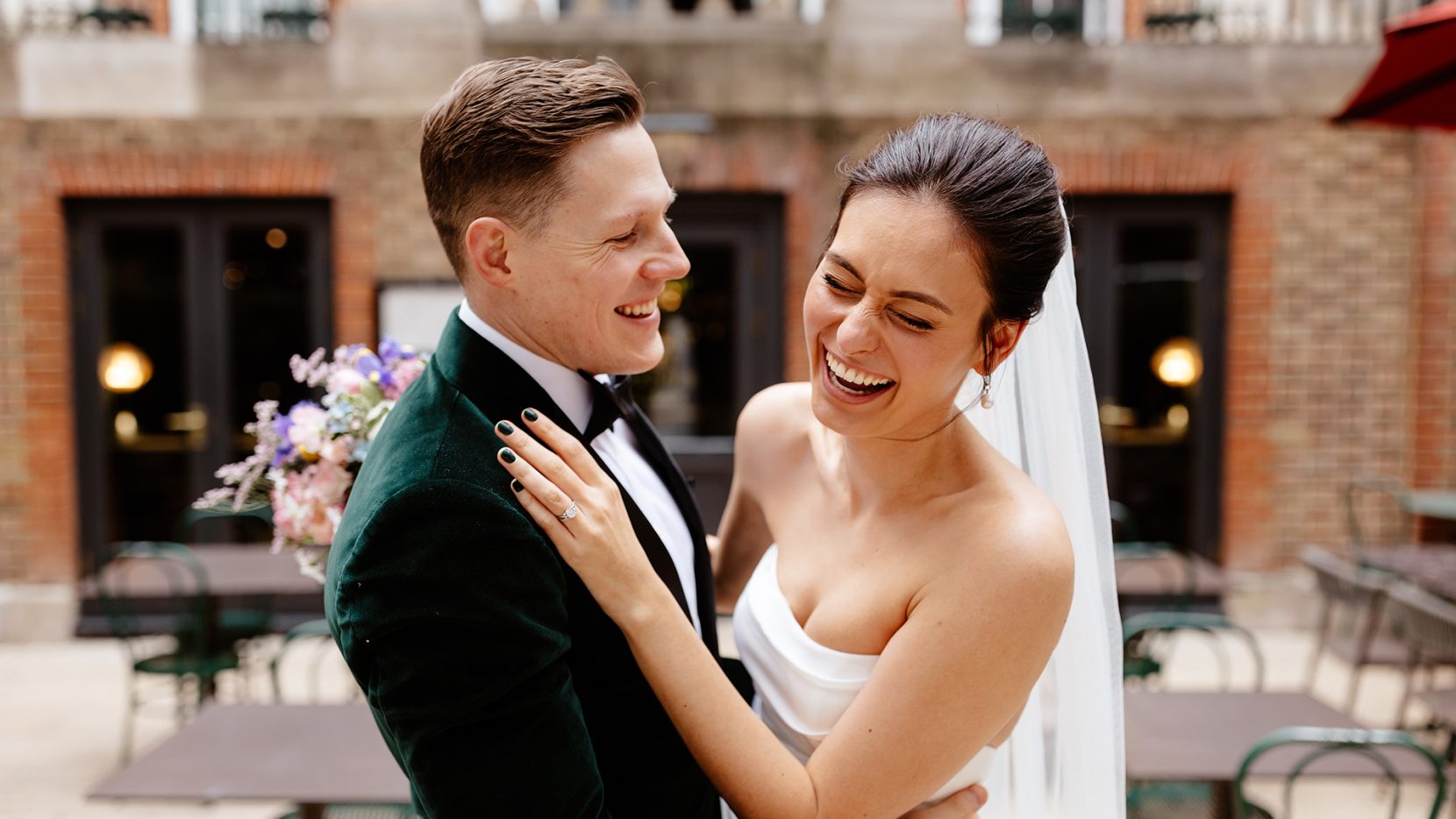The butterflies in your stomach have finally settled: the love of your life popped the question (you said “yes”, of course) weeks ago and now it’s starting to sink in. And suddenly, you’ve realised that you’ve got a wedding to plan.
From finding the perfect venue to curating a delicious menu, through to organising the guest list, there’s a lot to think about when putting together your big day. It’s all very exciting, though it might also feel a bit overwhelming.
But don’t worry—with solid planning, you can absolutely take on the challenge. And, dare we say, you might even enjoy it. We’ve put together the complete, step-by-step guide to planning a wedding to help get you on the right track.
Contents
1. Set your budget
2. Decide on the details
3. Find your perfect venue
4. Lock in the date and time
5. Finalise guest list, save the date
6. Assemble your bridesmaids or groomsmen
7. Sort guest accommodation and transport
8. Send out invites
9. Book your marriage licence appointment
10. Food and drink
11. Choose your cake
12. Entertainment
13. Arrange a registrar or celebrant
14. Your wedding attire
15. Buy your rings
16. Hair and makeup trial
17. Write your vows
18. Find a photographer
19. Flowers
20. Sort the seating plan
21. Finalise RSVPs
22. Confirm all the details
23. Create a schedule
24. Settle up your bills
25. It’s time!
How to plan a wedding on a budget
How to plan a wedding abroad
How long does it take to plan a wedding?
How to plan a wedding in six months
Planning a wedding checklist
The fundamentals
1. Set your budget
This is perhaps one of the most important steps when planning your wedding, because it will influence most (if not all) of the other decisions you’ll make.
When determining your budget, think about which aspects of the day are most important to you. Do you want to allocate more for entertainment, or is having a beautiful venue the main priority? We would suggest sitting down with your partner and making a list of non-negotiables and nice-to-haves, to help you work through it all.
It’s important to be realistic here, but also to leave a bit of wiggle room for additional or unexpected costs. For example, you might decide to set aside 10-15% extra, just in case.
2. Pin down the details: theme, style
Next, it’s time to decide what type of celebration you want to have. Are you thinking of something intimate and low-key, or perhaps more grand and glamorous?
Consider the feel and vibe you want the day to have: vintage, rustic, romantic, classic, modern, whimsical, etc. The possibilities really are endless—which can feel like both a blessing and a curse!
If you’re not already on Pinterest, we recommend signing up and pinning ideas you like to help you narrow down your options. After a while, you’ll notice themes and trends among the ideas you’ve pinned.
At this stage, you just need to have a rough idea of what you’re looking for. You’ll finalise things like décor as you get stuck further into the planning.
3. Find your perfect wedding venue
Now it’s time to find your ideal wedding venue. This is one of the most important steps in the process.
Your venue should be the perfect backdrop to the day’s festivities, with enough space for your guests to feel comfortable and the right facilities to bring your vision to life.
Don’t rush this bit. And when you go in to take a look at your potential venues in person, have your list of questions ready. The staff will be happy to answer and help as best they can—they understand how important this day is.
As well as ensuring your venue ticks all the practical boxes, think about how being in that space makes you feel. Could you see yourself getting married there? Does it feel right?
4. Lock in the date and time
A crucial part of planning a wedding is deciding on a date and time. You might do this a year or even 18 months ahead of time—some even book their date two years in advance (this may be the case if you want to get married in busier seasons, such as summer).
That said, it’s perfectly possible to put together a wedding in a matter of months! It’s really up to you, but generally, the sooner you lock in your venue the better. This frees you up to focus on other elements of the planning.
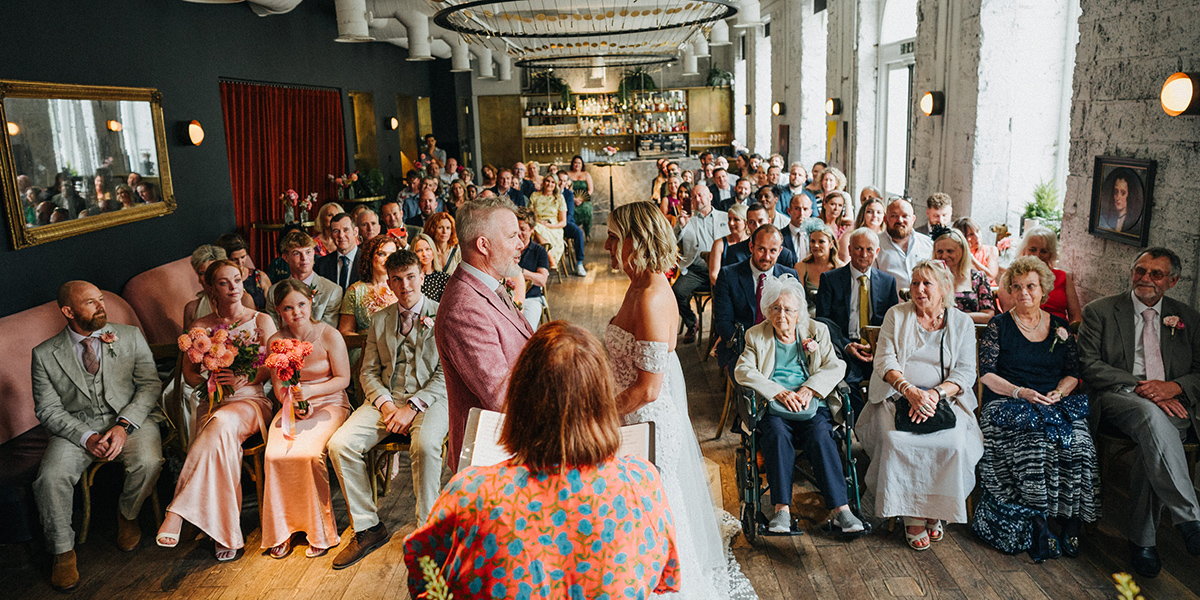
5. Finalise your guest list and save the date
Next, let your guests know when the special day is. Most people will send out a “save the date” invite four to six months before the day, but if you’re having a destination wedding then you might decide to give even more notice. Again, it’s totally up to you.
Here, you might also want to think about the season you want to get married in. Some people have their hearts set on an outdoor wedding, for instance—so the warmer months would probably be a better choice.
You’ll also need to think about things like: will you allow people to bring plus-ones? Will you have ceremony and evening guests? Will you allow children on the day? Think about your budget and chat with your partner to sort this out.
6. Assemble your bridesmaids or groomsmen
Now it’s your turn to pop a question: will you be in my bridal party, or will you be one of my groomsmen? Some people like to send cards or gifts when asking, while others may favour a more casual approach.
Either way, you want to have confirmed who will be a part of your day in these roles. You also want them to be aware of any responsibilities you’d like them to have (like planning your hen/stag do).
7. Sort guest accommodation and transport
If you have family or friends travelling from afar, you may choose to arrange accommodation for them. Whether you pay for or subsidise this is totally up to you, but it can be a nice gesture to handle the logistics for them at least.
You may also decide to sort out late-night transport from the venue. Some weddings will arrange a shuttle bus service to different accommodations, for instance if they know that a lot of guests are staying in a particular hotel.
There’s also the option to arrange transport from the ceremony venue to the reception, if they’re in different places.
8. Send out your invites
It’s all starting to feel a bit real, isn’t it? Send out invites to your guestlist and wait for those RSVPs to roll in. These days, lots of people choose to create a wedding website and email their invites—which we think works wonderfully. That said, it can also be quite special to go old school and send your invites in the post. Totally up to you.
9. Book your marriage licence appointment
To be legally married in the UK (or to enter into a civil partnership), you need to give your local register office notice. Basically, you’re letting them know that you plan to get married.
You should book your appointment at least 29 days before your wedding day, but you have 12 months from the date to give your notice. You’ll need to bring certain documents with you, including proof of ID and nationality, home address, any previous marriage documents (if you have them), and the details of your venue.
In certain cases, you might need to bring additional documents, so check in with your specific office ahead of your appointment to be sure.
After you’ve registered your notice, there’s a 28 day waiting period before you’re able to have your ceremony.
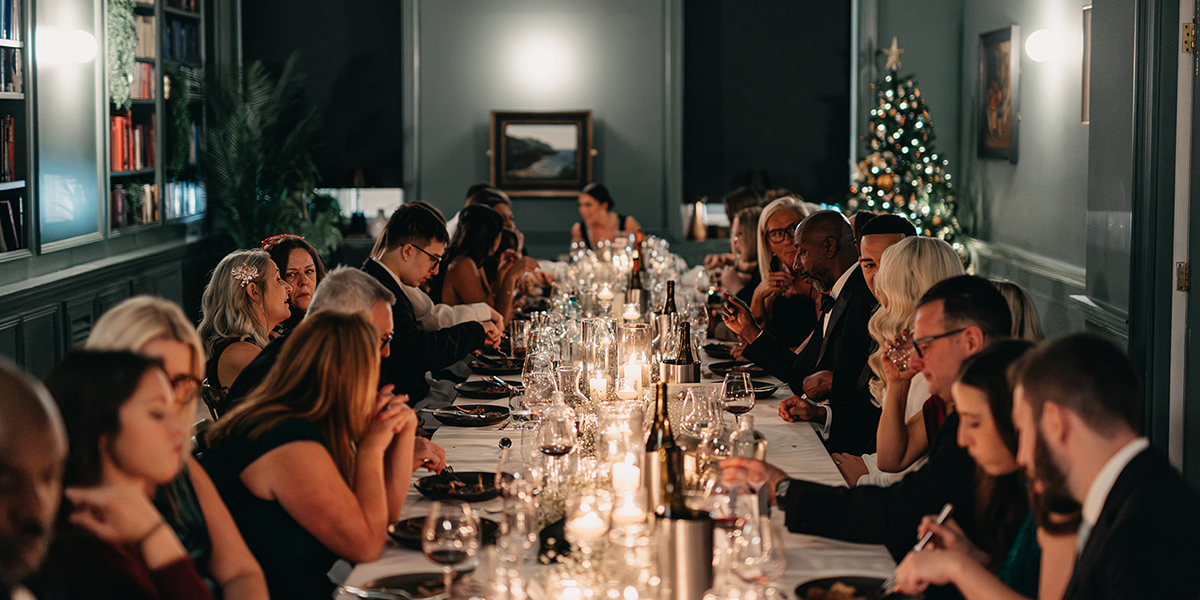
The details
10. Food and drink
Okay, all the essential factors are in place and now it’s time to iron out the details. For one: what food and drink will you serve?
Here, you’ll need to check in with the venue about what they can provide and their policy on allowing external suppliers. Many venues will provide catering. For instance, Cellar, our Hammersmith bar and restaurant, is on the ground floor of our building, so your guests can enjoy fresh, flavoursome dishes crafted with a chef’s finesse. Venues that don’t serve food will typically allow you to bring your own caterers in.
Usually, your venue will have a menu tasting session with you ahead of time. You also might have the choice between different types of service, such as canapé and standing bites, family style or plated. At Kindred, we’ve got options to suit all styles of celebrations—including a dedicated menu for late-night comfort food.
11. Choose your cake
We’ve put this as a separate list item because for many couples, deciding on their wedding cake is a special moment in itself. It’s less common for venues to provide the cake, so you’ll likely need to bring in your own supplier.
Again, we’d suggest starting on Pinterest to get some ideas. We’ve also made a list of 41 wedding cake ideas to help the inspiration flow.
12. Entertainment
Most weddings will include some sort of entertainment, whether that’s a drag queen brunch or wedding caricaturist. Usually though, wedding entertainment involves live music. A popular choice is to have a band to get people on their feet and then a DJ to keep the party going.
If you’re stuck, our events team would be happy to help you find the perfect act for your event. In the meantime, we’ve put together 50 fun and unique wedding entertainment ideas to help get the ball rolling.
13. Arrange a registrar or celebrant
For those planning to do the legal bits on the day itself, you’ll need to arrange a registrar to come along and do the honours. Usually, you can sort this out with the council for the area your venue is in. You can contact the office directly or have your venue help to arrange this.
Celebrants, on the other hand, aren’t able to perform legally binding marriages in England and Wales. They’re more like a host who leads the ceremony.
These days, many couples choose to sort the legal bit first, on a separate day, and then have a celebrant-led wedding at the event. However, you could also do both on your wedding day—it’s completely down to what you prefer.
14. Your wedding attire
This is perhaps one of the most special parts of the process: finding your wedding suit or dress. Depending on how important this is to you, you might decide to invite some of your nearest and dearest along as you try on different options.
Above all, you want to feel amazing in your outfit; like the best version of yourself. Whether you’re looking for something more traditional, modern or whimsical, your perfect fit is out there waiting.

15. Buy your rings
Traditionally, couples choose the rings for each other and present them on the day itself. But these days, lots of people prefer to decide on the rings together and split the costs.
Wedding bands don’t necessarily have to match, though that is a popular choice. It’s completely down to your personal preferences. Some people like to stack their wedding and engagement rings after the day, for example, so that might factor into your decision as well.
While there are conventions around how wedding rings are worn, you should do what feels best for you.
16. Hair and makeup trial
Before the big day, it’s common to have a trial run of your hair and makeup. This might be a few months ahead of time.
This is a chance for you to give any feedback and perfect your look—and to get a sense of how it will all come together on the day.
17. Write your vows
We recommend giving yourself plenty of time to write your vows: you don’t want to feel rushed or pressured when putting them together. It will probably take you a few drafts to get to a final version you’re happy with.
It’s also a good idea to check in with your partner about the length and style of your vows. Will they be more heartfelt and personal, or did you want to do something more casual? And how long do you want them to be? If one person shares stories at great length but the other just recites a few lines, it may throw off the vibe, for instance.
If you’re stuck, start by brainstorming all the things you could include: what do you love about them, what’s so special about your relationship? Then you can start to piece your ideas together into a cohesive set of vows.
18. Find a photographer
A great wedding photographer will capture the magic of the day. Think candid shots at golden hour, the two of you locking eyes under a stream of confetti, or perhaps stealing a kiss in front of a moving tube (which is what one of our couples at Kindred chose).
When finding the right photographer, you should consider price, their style (which you’ll be able to gauge from their portfolio) and the type of package you want. To give you an idea: in the UK, the average cost of a wedding photographer in 2025 is around £1,400-1,700.
Many photographers will also ask you what sort of photos you want. Do you want more candid shots or are you after more classic, traditional portraits? Or perhaps somewhere in between? They may also have props—such as bubble guns—to give your photos that little something extra.
19. Flowers
If you want to have flowers on the day, you have two options: enlist a florist to sort this for you (with input from you, of course) or buy the flowers directly and do it yourself.
Depending on what sort of vibe you’re going for, the latter option might be absolutely fine: we’ve seen gorgeous, elegant weddings that featured simple vases of white roses, as well as more rustic events where couples used bunches of foliage to decorate.
20. Sort the seating plan
This may sound like something minor, but it’s important to dedicate some time to planning who will sit where.
Here, it can help to start by thinking about who (if anyone) you want to have on your table besides your new spouse. Do you want to have your parents and close family? Or perhaps the bridal party? Then, try to group your guests as logically as possible based on their connections to each other. It’s also a good idea to consider personalities: for instance, you might decide to seat more outgoing guests near those who are naturally a bit quieter.
You might also decide to name the different tables after places, things, or events that are important to you—for instance, places you’ve travelled together.
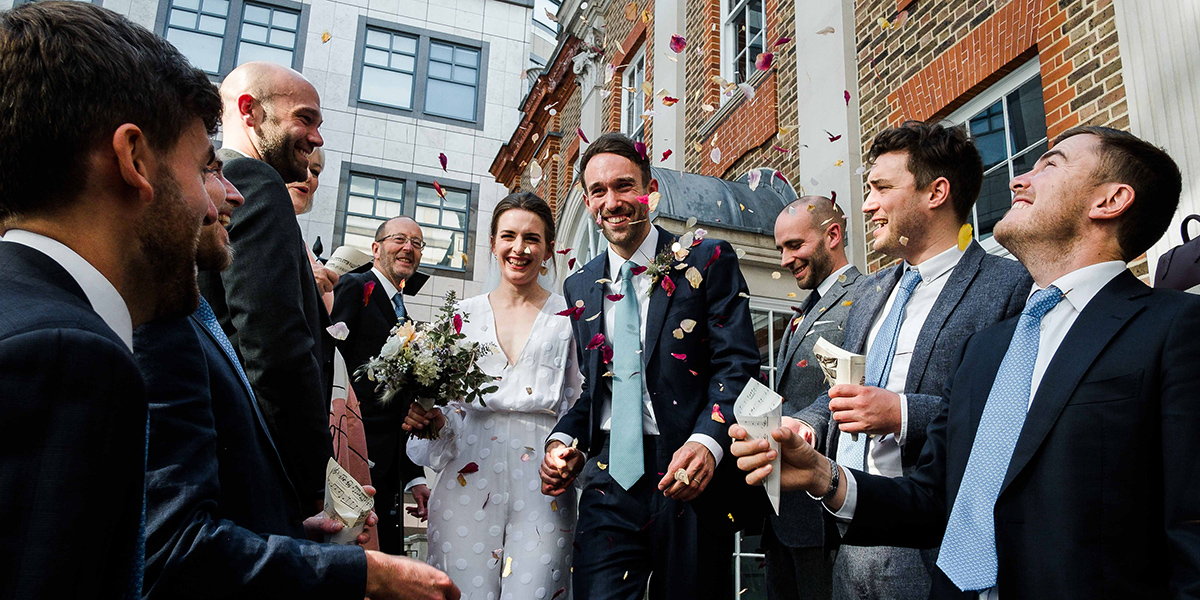
The finishing touches
21. Finalise RSVPs
Confirm your final guest list and let your venue know how many will attend. You should also share any important information like dietary and accessibility requirements, too.
22. Confirm all the details
You’re almost there! By now, you’ll have all your suppliers locked in and will have an outline for how the day should run. It’s a good idea to get in touch with everyone and just confirm they’re all on track for the big day.
23. Create a schedule
Most weddings will have a schedule that guests can see on the day. But it can also be super helpful for you to have your own, more detailed version. Not only will this help you stay organised but it will remind you that everything is in hand: you’ve done all the hard work. Now it’s time for things to fall into place.
For example, your morning schedule might look something like:
9am: Hair and makeup
10am: Suppliers begin to arrive
11:30am: Get dressed with bridal party
1pm: Guests begin to arrive
It’s helpful to be specific but don’t panic if something unexpected happens or you’re slightly thrown off. Wedding suppliers are professionals and will know what to do—and your day will still be perfect.
24. Settle all your final bills
Ensure all your bills with your suppliers are settled and that everything is in order. It might sound like a small thing, but this is the final confirmation that everything is sorted and ready to go. Enjoy it!
25. It’s time
The big day has arrived; you’re getting married! By now, you’ve done everything you can to organise the day and all that’s left is to be present in the moment and enjoy. You’ll make memories today that will last a lifetime—don’t waste even a minute sweating the small stuff.
Your venue and suppliers are here to help you: they know what they’re doing. Let them work their magic.
How to plan a wedding on a budget
Working to a budget? No problem. You can still follow all of the steps above, though your decisions will be influenced by the numbers you’re looking at.
Your venue, catering and entertainment (if you choose to have it) will likely be your biggest expenses. But there are more cost-effective options available. Do your research and decide on what’s most important to you. You may decide to spend more on a beautiful venue but cut costs around the entertainment, for instance.
There’s also certain elements you can cut back on, or even remove entirely. For instance, you could do your hair and makeup yourself, or have a skilled friend do it for you as their wedding gift. Some couples also make their own wedding décor or opt for a lower-key cake. It’s also becoming more popular for couples to make their own wedding bouquets.

How to plan a wedding abroad
This option will take a bit more planning, but it can certainly be worth it. You’ll likely have to travel to the destination when sorting your venue, and possibly to meet with suppliers.
Perhaps the biggest consideration here is costs. As well as flying back and forth while organising the event, you’ll need to think about travel and accommodation around the day itself. And if your guests will be paying for their own flights and stays, the more notice you can give them, the better. Typically, people will send invites nine months to a year in advance.
Often, couples will host additional events a day or two before the wedding—and sometimes the day after. There’s costs and logistics to this, too, so be sure to take the time to plan it all out.
Some countries may have rules around who can legally get married there. Be sure to look into this before you start booking anything: it may be better to do the legal bit in the UK and have a celebrant-led wedding abroad.
As you’ll need to coordinate all your suppliers, it can be helpful to have someone who lives in your destination country to help. This might be a friend or family member, or even someone from your venue.
How long does it take to plan a wedding?
How long is a piece of string? It can take as long as you like, while it’s also possible to put a wedding together in a matter of months.
But, on average, most people will put aside 12-18 months to sort everything out. This allows enough time to find and book all your preferred suppliers, including your venue. It also gives you wiggle room to adapt in case anything changes.
How to plan a wedding in six months
While it might not be everyone’s cup of tea, it’s definitely doable to plan a wedding in six months. The main challenge will be pinning down your venue and suppliers, who may be booked up already. And you’ll want to do that all while giving your guests enough notice so they’ll save the date.
But the steps you’ll follow will broadly mirror the above. Some venues—like us here at Kindred—can help you arrange things like food, drinks and entertainment, to make the process as smooth and stress-free as possible.
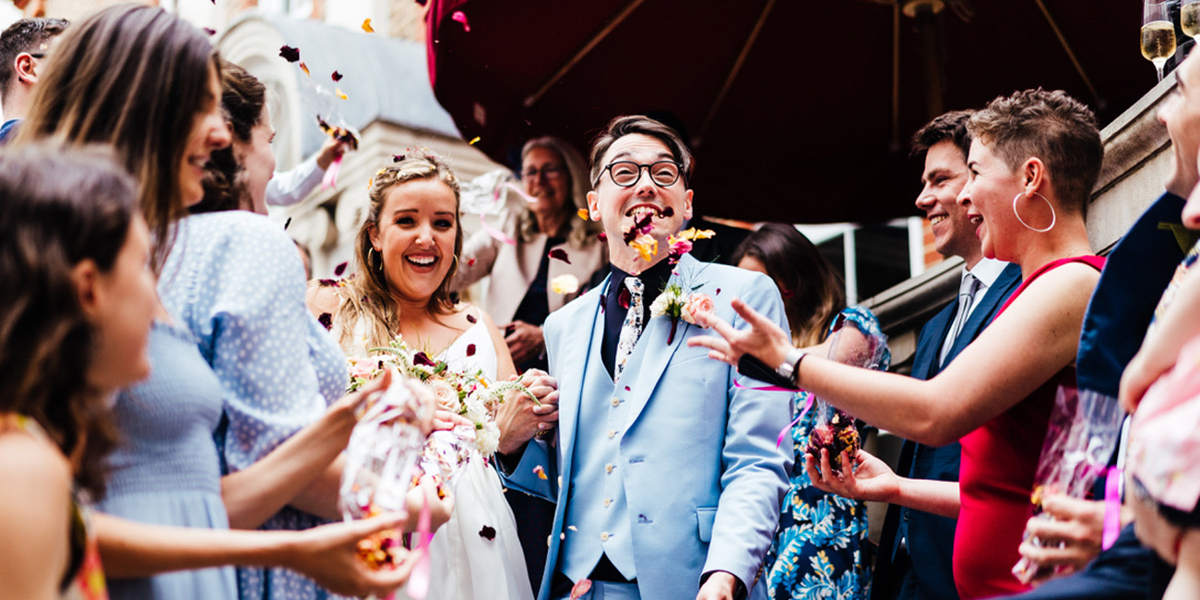
Planning a wedding checklist
Ready to get cracking and plan your wedding? We’ve put the above into a checklist to help you stay on track.
The fundamentals
1. Set your budget
2. Decide on the details (theme, style)
3. Find your perfect venue
4. Lock in the date and time
5. Finalise guest list, save the date
6. Assemble your bridesmaids or groomsmen
7. Sort guest accommodation and transport
8. Send out invites
9. Book your marriage licence appointment
The details
10. Food and drink
11. Choose your cake
12. Entertainment
13. Arrange a registrar or celebrant
14. Your wedding attire
15. Buy your rings
16. Hair and makeup trial
17. Write your vows
18. Find a photographer
19. Flowers
20. Sort the seating plan
The finishing touches
21. Finalise RSVPs
22. Confirm all the details
23. Create a schedule
24. Settle up your bills
25. It’s time!
Your wedding venue
Choosing the right wedding venue is truly one of the most important decisions you’ll make about the day. It should set the tone and feel for the event, make guests feel comfortable and cared for, and act as a backdrop to some lifelong memories.
Kindred is a much-loved West London wedding venue right in the heart of Hammersmith. We have a variety of spaces across all three floors of our building to suit all sorts of celebrations: from elegant and intimate private dinners to late-night dance parties.
With an on-site restaurant, we’ll help you create the perfect menu—while each floor of our building has a well-stocked private bar. Whether you’re after characterful European wines, a selection of craft beers or expertly-mixed cocktails, we’ve got you covered.
Take a look through our wedding brochure to learn more or have a virtual tour of our building. If you’d like to come and visit us in person, get in touch with our team to arrange it. We’d be delighted to meet you and bring your dream wedding to life.

